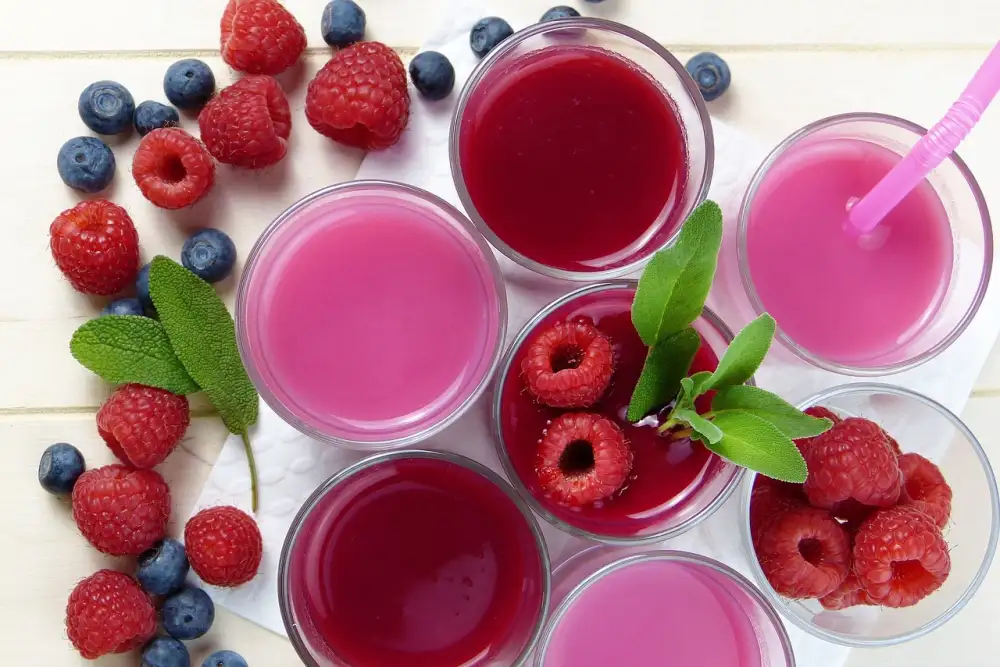Revitalize Your Health with a Nourishing Juice Diet Plan

Are you looking for a way to revitalize your health and boost your energy levels? Look no further than the juice diet! This popular diet plan has gained traction in recent years as a simple and effective way to detoxify the body, lose weight, and improve overall well-being. By replacing solid food with nutrient-rich juices, you can flood your system with vitamins, minerals, and antioxidants that promote healing and rejuvenation. In this article, we will explore the benefits of the juice diet, how it works, types of juices to include in your plan, tips for getting started, potential risks and precautions to consider, incorporating exercise into your routine, success stories from those who have tried it, and ultimately help you decide if the juice diet is right for you. So grab a glass of fresh juice and let's dive in!
Benefits of the Juice Diet
The Juice Diet offers numerous benefits for your health and well-being. Firstly, it provides a quick and easy way to consume a wide variety of fruits and vegetables, ensuring you get all the essential vitamins, minerals, and antioxidants your body needs. This can lead to increased energy levels, improved digestion, and a strengthened immune system. Additionally, the high water content in juices helps to hydrate your body and flush out toxins. The Juice Diet is also known for its potential weight loss benefits as it can reduce calorie intake while still providing necessary nutrients. Lastly, many people report clearer skin, improved mental clarity, and a general sense of rejuvenation when following a juice diet plan.
How the Juice Diet Works
The juice diet works by replacing solid food with nutrient-rich juices made from fruits, vegetables, and herbs. These juices are packed with vitamins, minerals, and antioxidants that help cleanse the body and promote overall health. When you consume only juices for a period of time, your digestive system gets a break from processing solid food, allowing it to rest and rejuvenate.
During the juice diet, your body receives all the essential nutrients it needs while eliminating toxins and waste. The high water content in the juices helps to hydrate your body and flush out toxins. The enzymes present in fresh juices aid digestion and absorption of nutrients. Additionally, the low calorie content of the juices can lead to weight loss.
It is important to note that the duration of a juice diet can vary depending on individual goals and health conditions. Some people choose to do a short-term juice cleanse for a few days or weeks, while others may opt for a long-term juice diet as part of their lifestyle.
To ensure maximum benefits from the juice diet, it is recommended to consume a variety of juices throughout the day. This ensures that you receive a wide range of nutrients from different fruits and vegetables. It is also advisable to drink freshly prepared juices rather than store-bought ones, as they may contain added sugars or preservatives.
While on a juice diet, it is important to listen to your body's signals. If you feel weak or experience any adverse effects, it is crucial to consult with a healthcare professional. It is also important to gradually reintroduce solid foods after completing a juice cleanse to avoid shocking your digestive system.
Overall, the juice diet works by providing your body with essential nutrients while allowing it to detoxify and rejuvenate. However, it is important to approach this diet plan with caution and consult with a healthcare professional before making any significant changes to your eating habits.
Types of Juices to Include in the Diet
When it comes to the juice diet, there are various types of juices that you can include in your daily routine. These juices not only provide essential nutrients but also add a burst of flavor to your diet. Some popular options include green juices, which are made from leafy greens like spinach and kale. These are rich in vitamins and minerals. Citrus juices, such as orange and grapefruit, are packed with vitamin C and antioxidants. Beetroot juice is known for its detoxifying properties and can help improve blood circulation. Additionally, you can try incorporating carrot juice for its high beta-carotene content or pineapple juice for its anti-inflammatory benefits. Experiment with different combinations to find the flavors that suit your taste buds and meet your nutritional needs.
Tips for Starting a Juice Diet
1. Start Slowly: Ease into the juice diet by replacing one meal or snack with a fresh juice each day. Gradually increase the number of juices and replace all meals over time.
2. Choose Fresh, Organic Produce: Opt for organic fruits and vegetables to minimize exposure to pesticides and maximize nutritional benefits.
3. Experiment with Flavors: Mix different fruits and vegetables to create unique flavors and prevent boredom. Don't be afraid to add herbs or spices for added taste.
4. Stay Hydrated: Alongside your juices, drink plenty of water throughout the day to stay hydrated and flush out toxins from your body.
5. Listen to Your Body: Pay attention to how your body responds to the juice diet. If you feel weak or experience any adverse effects, consult a healthcare professional.
6. Prepare in Advance: Plan your juice recipes in advance and prepare them ahead of time for convenience. This will help you stick to the diet without feeling overwhelmed.
7. Incorporate Fiber: While juicing removes fiber, it's important to include some fiber in your diet. Add chia seeds or psyllium husk powder to your juices for added fiber content.
8. Keep a Journal: Track your progress, energy levels, and any changes you notice in your health while on the juice diet. This will help you assess its effectiveness for you personally.
Remember, before starting any new diet plan, it's always best to consult with a healthcare professional or registered dietitian who can provide personalized advice based on your individual needs and health conditions
Potential Risks and Precautions
While the juice diet can offer numerous health benefits, it is important to be aware of potential risks and take necessary precautions. Firstly, it is essential to consult with a healthcare professional before starting any new diet plan, especially if you have any underlying health conditions or are taking medication.
One of the main concerns with a juice diet is the lack of essential nutrients such as protein and fiber. It is important to ensure that you are still getting these nutrients through other sources or by incorporating them into your juices. Additionally, prolonged juice fasting may lead to nutrient deficiencies and muscle loss.
Another risk associated with the juice diet is the potential for blood sugar imbalances. Juices made primarily from fruits can cause a rapid spike in blood sugar levels, which can be problematic for individuals with diabetes or insulin resistance. It is advisable to include more vegetables in your juices to help balance out the sugar content.
Furthermore, it is crucial to listen to your body during a juice diet. If you experience dizziness, fatigue, or other adverse effects, it may be a sign that the diet is not suitable for you. It is important to stay hydrated and monitor your energy levels throughout the day.
Lastly, it is worth noting that the juice diet should not be followed as a long-term solution for weight loss or as a substitute for regular meals. It should be used as a short-term cleanse or detoxification program under proper guidance.
By being aware of these potential risks and taking necessary precautions, you can safely incorporate the juice diet into your lifestyle and reap its many benefits.
Incorporating Exercise with the Juice Diet
While the juice diet can provide numerous health benefits, it is important to remember that exercise is also a crucial component of a healthy lifestyle. Incorporating regular physical activity into your routine can enhance the effectiveness of the juice diet and promote overall well-being.
Engaging in moderate-intensity exercises such as brisk walking, cycling, or swimming for at least 30 minutes a day can help boost metabolism, burn calories, and improve cardiovascular health. This combination of exercise and the nutrient-rich juices from your diet can lead to increased energy levels and weight loss.
It is advisable to consult with a healthcare professional before starting any new exercise regimen, especially if you have any underlying health conditions. They can provide guidance on suitable activities and intensity levels based on your individual needs.
Remember to listen to your body during exercise and make adjustments as necessary. If you feel fatigued or lightheaded, take a break and replenish your body with hydrating fluids such as water or coconut water.
In conclusion, incorporating exercise alongside the juice diet can maximize its benefits and contribute to long-term health improvements. Find activities that you enjoy and make them a regular part of your routine. Remember, consistency is key when it comes to achieving optimal results.
Success Stories and Testimonials
Many individuals have experienced significant health improvements through the juice diet. Sarah, a 35-year-old mother of two, lost 20 pounds in just one month by following a juice diet plan. She reported increased energy levels, improved digestion, and clearer skin.
John, a 45-year-old office worker, shared his success story of reducing his cholesterol levels by incorporating a juice diet into his lifestyle. After three months of juicing, his doctor was impressed with the positive changes in his overall health.
Another success story comes from Lisa, a 28-year-old fitness enthusiast who used the juice diet to enhance her athletic performance. She found that consuming nutrient-rich juices before workouts provided her with sustained energy and faster recovery times.
These testimonials highlight the transformative effects of the juice diet on individuals' health and well-being. While everyone's experience may vary, these stories demonstrate the potential benefits that can be achieved through this nourishing and revitalizing approach to nutrition.
While the juice diet can offer numerous health benefits and help jumpstart weight loss, it may not be suitable for everyone. It is important to consider your individual needs, preferences, and any underlying health conditions before starting a juice diet. Consulting with a healthcare professional or registered dietitian is recommended.
If you are looking for a way to revitalize your health, increase your intake of fruits and vegetables, and potentially lose weight, the juice diet could be worth exploring. However, it is crucial to approach it with caution and ensure that you are meeting your nutritional needs. Remember to listen to your body and make adjustments as needed.
Ultimately, the decision to embark on a juice diet should be based on your own research and understanding of its potential benefits and risks. With proper planning and guidance, the juice diet can be a refreshing way to nourish your body and improve your overall well-being.
Published: 13. 12. 2023
Category: Health



